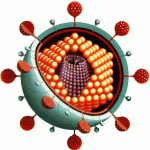Virology
|
17 december 2014 16:49:47 |
| Inhibitory effects of astaxanthin on azoxymethane-induced colonic preneoplastic lesions in C57/BL/KsJ-db/db mice (Epidemiologic Perspectives & Innovations) |
|
Tweet Background:
Obesity and related metabolic abnormalities, including excess oxidative stress and chronic inflammation, are associated with colorectal carcinogenesis. Astaxanthin, a xanthophyll carotenoid found in aquatic animals, is known to possess antioxidant, anti-inflammatory, and antineoplastic properties. The present study examined the effects of astaxanthin on the development of azoxymethane (AOM)-induced colonic premalignant lesions in C57BL/KsJ-db/db (db/db) obese mice.MethodMale db/db mice were administered 4 weekly subcutaneous injections of AOM (15?mg/kg body weight) from 5?weeks of age and subsequently, from 1?week after the last injection of AOM, were fed a diet containing 200?ppm astaxanthin throughout the experiment (8?weeks).ResultThe development of colonic premalignant lesions, i.e., aberrant crypt foci and ?-catenin accumulated crypts, was significantly inhibited in mice treated with astaxanthin than in mice fed the basal diet. Astaxanthin administration markedly reduced urinary levels of 8-OHdG and serum levels of d-ROMs, which are oxidative stress markers, while increasing the expression of mRNA for the antioxidant enzymes GPx1, SOD1, and CAT in the colonic mucosa of AOM-treated db/db mice. The expression levels of IL-1?, IL-6, F4/80, CCL2, and CXCL2 mRNA in the colonic mucosa of AOM-treated mice were significantly decreased by astaxanthin. Dietary feeding with astaxanthin also resulted in a reduction in the numbers of NF-?B- and PCNA-positive cells that were increased by AOM exposure, in the colonic epithelium.
Conclusion:
These findings suggest that astaxanthin inhibits the development of colonic premalignant lesions in an obesity-related colorectal carcinogenesis model by reducing oxidative stress, attenuating chronic inflammation, and inhibiting NF-?B activation and cell proliferation in the colonic mucosa. Astaxanthin, therefore, may be a potential candidate as a chemoprevention agent against colorectal carcinogenesis in obese individuals. |
| 134 viewsCategory: Pathology, Virology |
 Music therapy to promote psychological and physiological relaxation in palliative care patients: protocol of a randomized controlled trial (Epidemiologic Perspectives & Innovations) Music therapy to promote psychological and physiological relaxation in palliative care patients: protocol of a randomized controlled trial (Epidemiologic Perspectives & Innovations)PROGgeneV2: enhancements on the existing database (Epidemiologic Perspectives & Innovations) 
|
| blog comments powered by Disqus |
MyJournals.org
The latest issues of all your favorite science journals on one page
The latest issues of all your favorite science journals on one page



